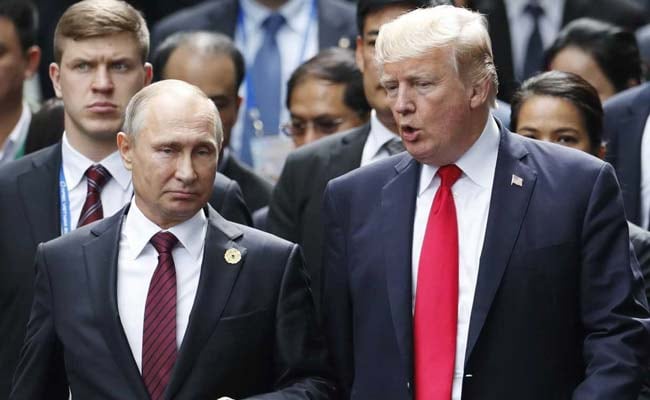
Moscow and Washington struck a deal on Wednesday to hold a summit soon between Russian President Vladimir Putin and U.S. President Donald Trump, a move likely to worry some U.S. allies and draw a fiery reaction from some of Trump's critics at home.
Kremlin foreign policy aide Yuri Ushakov, speaking after Putin met U.S. National Security Adviser John Bolton in the Kremlin, said the summit would take place in a mutually convenient third country and that several more weeks were needed to prepare for it.
"This meeting has been planned for a long time," Ushakov told reporters. "It has enormous importance for Russia and America, but it (also) has huge importance for the whole international situation. I think it will be the main international event of the summer."
Such a summit is likely to irritate U.S. allies who want to isolate Putin, such as Britain, or who are concerned about Trump's attitude towards Russia. It is also likely to go down badly among foreign and domestic critics who question Trump's commitment to NATO and fret over his desire to rebuild relations with Moscow even as Washington tightens sanctions.
Ushakov said Moscow and Washington would announce the time and place of the summit on Thursday, but that Putin and Trump were likely to hold talks for several hours when they met and hold a joint news conference.
He spoke of a possible joint declaration at the summit on improving U.S.-Russia relations and international security and said the Kremlin was pleased with how Bolton's visit had gone.
Russian Foreign Minister Sergei Lavrov might also meet his U.S. counterpart Mike Pompeo, he added.
The summit is expected to take place after Trump attends a NATO summit and visits Britain next month. A senior U.S. official said on Tuesday that Finland's capital Helsinki was being considered as a location.
Bolton, a lifelong hawk who warned last year before his own appointment that Washington negotiated with Putin's Russia at its peril, was due to give a news conference at around 1600 GMT, where he might provide further details.
Trump congratulated Putin by phone in March after the Russian leader's landslide re-election victory and said the two would meet soon.
Since then, already poor ties between Washington and Moscow have deteriorated further over the conflict in Syria and the poisoning of a former Russian spy in Britain which sparked big diplomatic expulsions in both countries.
Washington and Moscow are also at odds over Ukraine and allegations of Russian interference in the 2016 U.S. presidential election, something Russia denies.
LOW EXPECTATIONS
Expectations for the outcome of any Putin-Trump summit are therefore low, even though Trump said before he was elected that he wanted to improve battered U.S.-Russia ties.
A special prosecutor in the United States has indicted Russian firms and individuals for meddling in the presidential election to benefit Trump, and is investigating whether anyone in Trump's campaign helped the Russian effort. Trump denies wrongdoing and calls the investigation a "witch hunt".
Putin told Bolton on Wednesday that U.S.-Russia relations were not "in the best shape," something he said he put down to domestic political tussling in the United States.
"...But your visit to Moscow gives us hope that we can at least take the first steps to restore full-scale relations between our states," he said. "Russia never sought confrontation."
Aware that his own visit and the summit will draw criticism from some quarters, Bolton stressed the importance of talking to each other despite disagreements.
"Even in earlier days, when our countries had differences our leaders and their advisers met and I think that was good for both countries, good for stability in the world. President Trump feels very strongly on that subject," said Bolton.
Saying he wanted to find areas where the two countries could agree, Bolton also praised Russia's hosting of the 2018 soccer World Cup, while Putin congratulated the United States on winning the right to jointly host the 2026 tournament.
Ushakov, the Kremlin aide, said that the subject of sanctions had not come up on Wednesday and named four main summit themes: Strategic nuclear stability, the fight against international terrorism, regional issues like the Ukraine and Syria conflicts, and U.S.-Russia ties.
The United States initially sanctioned Russia over its 2014 annexation of Ukraine's Crimea region and its backing for a pro-Russian uprising in eastern Ukraine. Subsequent sanctions have punished Moscow for what Washington has called its malign behaviour and alleged meddling in U.S. politics.
Some Trump critics say Russia has not significantly altered its behaviour since 2014 and should therefore not be given the prestige that they believe a summit would confer.
(Additional reporting by Maria Tsvetkova and Maria Kiselyova; Editing by Catherine Evans/Mark Heinrich)
Track Latest News Live on NDTV.com and get news updates from India and around the world

